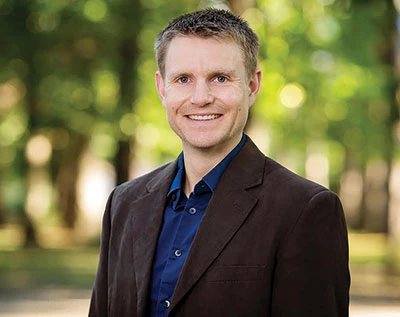Last updated: March 21, 2021
Article
How professional organizations were critical to my career
By Matthew H. E. M. Browning

Brian Stauffer, University of Illinois at Urbana-Champaign News Bureau
I recently graduated from a doctoral program and spent nine months in a job search. I also helped develop the graduate student career workshop at the 2015 George Wright Society conference that we describe in the accompanying research report published on these pages of Park Science.
I found that most of the study results matched my personal experience. I was interested in multiple career fields (nearly one-third of student respondents also indicated interest in multiple career sectors), and I ended up applying to jobs in all five career fields identified in the study. Simultaneously, I worked to gain experience, advanced education, social connections, and “a foot in the door,” and I felt all of these helped me write competitive job applications.
One study finding—the perceived lack of jobs—did not match my experience. I believed there was a relative abundance of job openings during the time I searched (June 2014 to February 2015), and I ended up applying for 18 openings, all of which had something to do with human dimensions of natural resources. Eleven of these were academic positions (9 of which were tenure-track), 4 were agency jobs (1 of which was a permanent position), 1 was corporate, 1 was nonprofit, and 1 was with a small firm, effectively an independent consultant. I also identified another 17 jobs during my search for which I could have applied but chose not to. Again, all of these focused on human dimensions of natural resources. My doctoral advisor was as surprised and happy at these opportunities as I was, saying, “I’ve never seen so many openings in our field.”
My biggest surprise from the study, however, was how closely the opportunities for professional organizations to help graduate students enter park and protected area careers matched my experience. I’ve been heavily involved in two nonprofit organizations during my graduate studies: the Children and Nature Network (C&NN) and the George Wright Society (GWS). Both of these organizations have been extremely generous in helping me pursue my career, and I believe I can attribute much of my career trajectory to the opportunities they’ve provided me.
Our study found that organizations could provide five types of opportunities for students: directly providing experience, indirectly providing experience, facilitating professional support, promoting peer networks, and offering focused education. Both C&NN and GWS contributed to each of these fields substantially. The Children and Nature Network provided me in-person trainings, webinar continuing education sessions, internship opportunities, research studies, a publication forum, and a strong peer network of “Natural Leaders” with similar interests and values to mine. Their professional support was also outstanding. Their former CEO served on my PhD committee, and their board members and partner agencies sponsored my initiatives, hired me for research projects, wrote recommendation letters for me, and sent me “insider information” on job openings. The George Wright Society was equally helpful. They offered me in-person trainings and conference workshops, research project opportunities, a publication forum, wonderful mentorship from the executive director and board, and a seat on the board of directors reserved solely for graduate students. I’m positive that both of these organizations also indirectly enhanced my ability to find a meaningful career in ways I have yet to identify.
I’m greatly indebted to these two organizations, and I see their offerings to be unequivocally correlated with my career. However, I believe that I was able to capitalize on their offerings partly because I remained focused on being aware of these opportunities and on putting together competitive applications for these opportunities. Some of my fellow graduate students were not as focused on working with professional organizations as I was. As such, I see a great potential for organizations to further connect students with meaningful careers. I believe the key will be increasing awareness of and participation in career opportunities from diverse groups of students, not just those who already prioritize working with, and taking advantage of, the opportunities provided by professional organizations.
